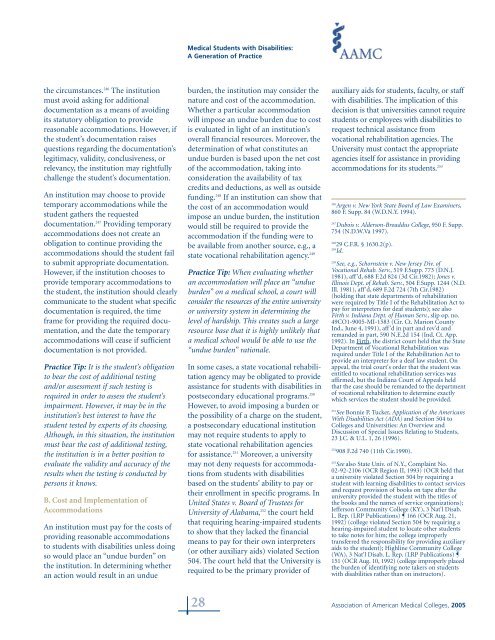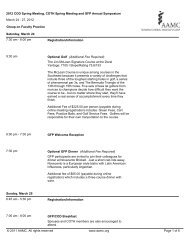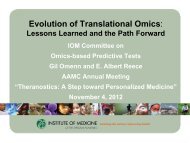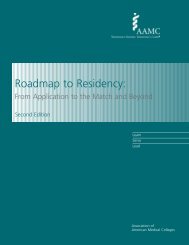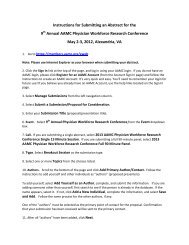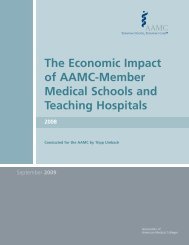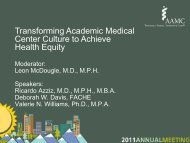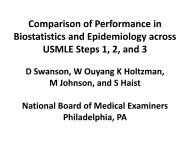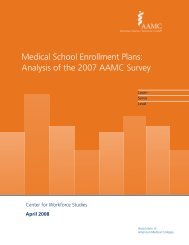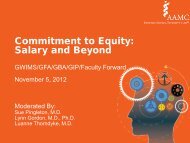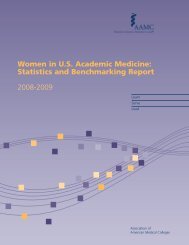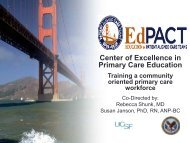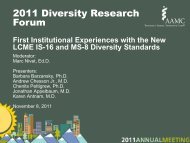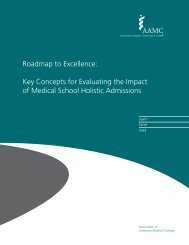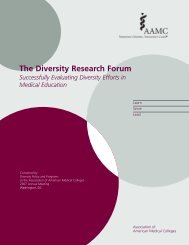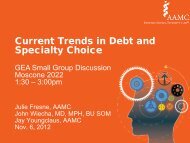Medical Students with Disabilities: A Generation of Practice
Medical Students with Disabilities: A Generation of Practice
Medical Students with Disabilities: A Generation of Practice
Create successful ePaper yourself
Turn your PDF publications into a flip-book with our unique Google optimized e-Paper software.
<strong>Medical</strong> <strong>Students</strong> <strong>with</strong> <strong>Disabilities</strong>:<br />
A <strong>Generation</strong> <strong>of</strong> <strong>Practice</strong><br />
the circumstances. 246 The institution<br />
must avoid asking for additional<br />
documentation as a means <strong>of</strong> avoiding<br />
its statutory obligation to provide<br />
reasonable accommodations. However, if<br />
the student’s documentation raises<br />
questions regarding the documentation’s<br />
legitimacy, validity, conclusiveness, or<br />
relevancy, the institution may rightfully<br />
challenge the student’s documentation.<br />
An institution may choose to provide<br />
temporary accommodations while the<br />
student gathers the requested<br />
documentation. 247 Providing temporary<br />
accommodations does not create an<br />
obligation to continue providing the<br />
accommodations should the student fail<br />
to submit appropriate documentation.<br />
However, if the institution chooses to<br />
provide temporary accommodations to<br />
the student, the institution should clearly<br />
communicate to the student what specific<br />
documentation is required, the time<br />
frame for providing the required documentation,<br />
and the date the temporary<br />
accommodations will cease if sufficient<br />
documentation is not provided.<br />
<strong>Practice</strong> Tip: It is the student’s obligation<br />
to bear the cost <strong>of</strong> additional testing<br />
and/or assessment if such testing is<br />
required in order to assess the student’s<br />
impairment. However, it may be in the<br />
institution’s best interest to have the<br />
student tested by experts <strong>of</strong> its choosing.<br />
Although, in this situation, the institution<br />
must bear the cost <strong>of</strong> additional testing,<br />
the institution is in a better position to<br />
evaluate the validity and accuracy <strong>of</strong> the<br />
results when the testing is conducted by<br />
persons it knows.<br />
B. Cost and Implementation <strong>of</strong><br />
Accommodations<br />
An institution must pay for the costs <strong>of</strong><br />
providing reasonable accommodations<br />
to students <strong>with</strong> disabilities unless doing<br />
so would place an “undue burden” on<br />
the institution. In determining whether<br />
an action would result in an undue<br />
burden, the institution may consider the<br />
nature and cost <strong>of</strong> the accommodation.<br />
Whether a particular accommodation<br />
will impose an undue burden due to cost<br />
is evaluated in light <strong>of</strong> an institution’s<br />
overall financial resources. Moreover, the<br />
determination <strong>of</strong> what constitutes an<br />
undue burden is based upon the net cost<br />
<strong>of</strong> the accommodation, taking into<br />
consideration the availability <strong>of</strong> tax<br />
credits and deductions, as well as outside<br />
funding. 248 If an institution can show that<br />
the cost <strong>of</strong> an accommodation would<br />
impose an undue burden, the institution<br />
would still be required to provide the<br />
accommodation if the funding were to<br />
be available from another source, e.g., a<br />
state vocational rehabilitation agency. 249<br />
<strong>Practice</strong> Tip: When evaluating whether<br />
an accommodation will place an “undue<br />
burden” on a medical school, a court will<br />
consider the resources <strong>of</strong> the entire university<br />
or university system in determining the<br />
level <strong>of</strong> hardship. This creates such a large<br />
resource base that it is highly unlikely that<br />
a medical school would be able to use the<br />
“undue burden” rationale.<br />
In some cases, a state vocational rehabilitation<br />
agency may be obligated to provide<br />
assistance for students <strong>with</strong> disabilities in<br />
postsecondary educational programs. 250<br />
However, to avoid imposing a burden or<br />
the possibility <strong>of</strong> a charge on the student,<br />
a postsecondary educational institution<br />
may not require students to apply to<br />
state vocational rehabilitation agencies<br />
for assistance. 251 Moreover, a university<br />
may not deny requests for accommodations<br />
from students <strong>with</strong> disabilities<br />
based on the students’ ability to pay or<br />
their enrollment in specific programs. In<br />
United States v. Board <strong>of</strong> Trustees for<br />
University <strong>of</strong> Alabama, 252 the court held<br />
that requiring hearing-impaired students<br />
to show that they lacked the financial<br />
means to pay for their own interpreters<br />
(or other auxiliary aids) violated Section<br />
504. The court held that the University is<br />
required to be the primary provider <strong>of</strong><br />
auxiliary aids for students, faculty, or staff<br />
<strong>with</strong> disabilities. The implication <strong>of</strong> this<br />
decision is that universities cannot require<br />
students or employees <strong>with</strong> disabilities to<br />
request technical assistance from<br />
vocational rehabilitation agencies. The<br />
University must contact the appropriate<br />
agencies itself for assistance in providing<br />
accommodations for its students. 253<br />
246<br />
Argen v. New York State Board <strong>of</strong> Law Examiners,<br />
860 F. Supp. 84 (W.D.N.Y. 1994).<br />
247<br />
Dubois v. Alderson-Broaddus College, 950 F. Supp.<br />
754 (N.D.W.Va 1997).<br />
248<br />
29 C.F.R. § 1630.2(p).<br />
249<br />
Id.<br />
250<br />
See, e.g., Schornstein v. New Jersey Div. <strong>of</strong><br />
Vocational Rehab. Serv., 519 F.Supp. 773 (D.N.J.<br />
1981), aff 'd, 688 F.2d 824 (3d Cir.1982); Jones v.<br />
Illinois Dept. <strong>of</strong> Rehab. Serv., 504 F.Supp. 1244 (N.D.<br />
Ill. 1981), aff 'd, 689 F.2d 724 (7th Cir.1982)<br />
(holding that state departments <strong>of</strong> rehabilitation<br />
were required by Title I <strong>of</strong> the Rehabilitation Act to<br />
pay for interpreters for deaf students); see also<br />
Firth v. Indiana Dept. <strong>of</strong> Human Serv., slip op.no.<br />
49CO1-9005-MI-1583 (Cir. Ct. Marion County<br />
Ind., June 4, 1991), aff 'd in part and rev'd and<br />
remanded in part, 590 N.E.2d 154 (Ind. Ct. App.<br />
1992). In Firth, the district court held that the State<br />
Department <strong>of</strong> Vocational Rehabilitation was<br />
required under Title I <strong>of</strong> the Rehabilitation Act to<br />
provide an interpreter for a deaf law student. On<br />
appeal, the trial court's order that the student was<br />
entitled to vocational rehabilitation services was<br />
affirmed, but the Indiana Court <strong>of</strong> Appeals held<br />
that the case should be remanded to the department<br />
<strong>of</strong> vocational rehabilitation to determine exactly<br />
which services the student should be provided.<br />
251<br />
See Bonnie P. Tucker, Application <strong>of</strong> the Americans<br />
With <strong>Disabilities</strong> Act (ADA) and Section 504 to<br />
Colleges and Universities: An Overview and<br />
Discussion <strong>of</strong> Special Issues Relating to <strong>Students</strong>,<br />
23 J.C. & U.L. 1, 26 (1996).<br />
252<br />
908 F.2d 740 (11th Cir.1990).<br />
253<br />
See also State Univ. <strong>of</strong> N.Y., Complaint No.<br />
02-92-2106 (OCR Region II, 1993) (OCR held that<br />
a university violated Section 504 by requiring a<br />
student <strong>with</strong> learning disabilities to contact services<br />
and request provision <strong>of</strong> books on tape after the<br />
university provided the student <strong>with</strong> the titles <strong>of</strong><br />
the books and the names <strong>of</strong> service organizations);<br />
Jefferson Community College (KY), 3 Nat'l Disab.<br />
L. Rep. (LRP Publications) 166 (OCR Aug. 21,<br />
1992) (college violated Section 504 by requiring a<br />
hearing-impaired student to locate other students<br />
to take notes for him; the college improperly<br />
transferred the responsibility for providing auxiliary<br />
aids to the student); Highline Community College<br />
(WA), 3 Nat'l Disab. L. Rep. (LRP Publications) <br />
151 (OCR Aug. 10, 1992) (college improperly placed<br />
the burden <strong>of</strong> identifying note takers on students<br />
<strong>with</strong> disabilities rather than on instructors).<br />
28 Association <strong>of</strong> American <strong>Medical</strong> Colleges, 2005


